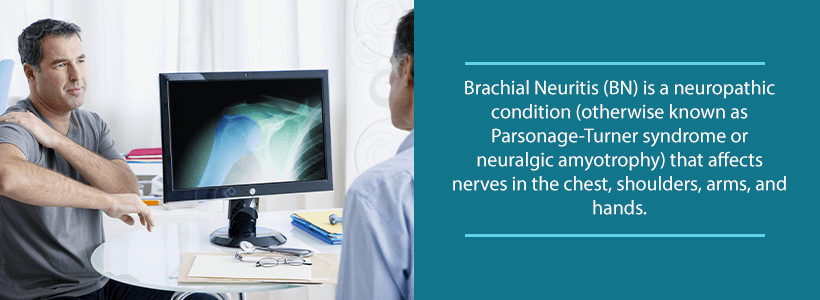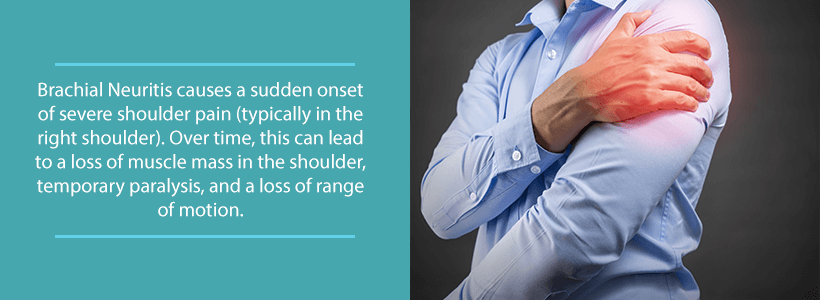If you’re dealing with frequent back or neck pain, your posture might be playing a bigger role than you think. Whether you're sitting at a desk all day or scrolling on your phone for hours,…
Brachial Neuritis (BN) is a neuropathic condition (otherwise known as Parsonage-Turner syndrome or neuralgic amyotrophy) that affects nerves in the chest, shoulders, arms, and hands. This condition causes pain and loss of functionality in the nerves that act as messengers between the brain/spinal cord and the rest of the body. These nerves that run along the spinal cord, neck, and shoulders are what medical experts call the brachial plexus. It is important to differentiate shoulder pain causes, as chest pain can be a symptom of a heart attack and not just shoulder injuries.
BN typically leads to terrible pain in the shoulders. After this episode expires, movement limitation then follows the extreme pain. Sudden shoulder pain may occur without a prior injury and could indicate a serious condition, such as a heart attack, especially if accompanied by other concerning symptoms. BN is a rare disorder with a very quick onset and usually is at its worst during the night time.
There are two main types of BN: idiopathic and inherited. Idiopathic means that the cause of the condition is largely unknown, while inherited BN is passed down amongst family members. The former is much more common than the latter. Usually, the condition is the result of the patient’s immune system attacking the body’s nerves. Presently, medical experts do not exactly know how nerve damage occurs in either idiopathic or inherited BN, but great strides in research are always being made.
It is not uncommon for BN to be the result of some sort of injury or trauma. Some injuries from contact sports, such as football or hockey, cause temporary weakness in the shoulder, as well as numbness and pain. More serious injuries from major trauma, such as a car accident or a harsh fall, lead to the same symptoms although their manifestation is much more persistent.
As stated previously, BN has two main causes: the patient either inherits it or the condition is idiopathic. The former is nowhere near as common as the idiopathic manifestation of the condition. As the name suggests, with inherited BN the parents of the patient pass down the ailment to their child. Idiopathic forms of BN are instead just forms of the condition where the cause is unknown. This version of BN is much more common than the inherited form.
A lot of the patients who have a sudden onset of BN have a few things in common. For one, many of them may say that they have just gotten over some other illness, disease, or germ. Others may say that they have just recently undergone some sort of test or treatment. This includes things such as spinal taps, injections, or other tests that utilize dyes. In addition to these treatments, some patients have a sudden onset of BN after receiving radiation treatment or surgery.
Symptoms of Brachial Neuritis: Intense Shoulder Pain
The condition almost always starts with some level of pain, ultimately leading to periods of muscle weakness and lost functionality. Rotator cuff tendinitis is another condition that can cause shoulder pain, characterized by inflammation or damage to the rotator cuff tendons. The severity and persistence of these symptoms will depend on which phase of the condition the patient is going through, as well as the specifics of their case. While symptoms vary from person to person, a general list is as follows:
- Sudden onset of extreme shoulder pain (typically the right shoulder). Many patients describe this type of pain as an intense stabbing or burning.
- Symptoms of pain exacerbate when the patient attempts to move the affected shoulder.
- Only the most powerful painkillers have any effect on treating the pain, with it still remaining constant for long periods.
- Many patients describe a loss of function or temporary paralysis in the shoulder muscles after a painful episode.
- Loss of muscle mass in the affected shoulder (atrophy).
- Multiple areas of numbness develop in different areas of the arm and/or shoulder.
- Sometimes BN affects the diaphragmatic nerves, which may result in shortness of breath.
Frozen shoulder, also known as adhesive capsulitis, is another condition that can cause similar symptoms, particularly in individuals aged 40 to 60, and often following rotator cuff issues.
Again, these are just to name a few general symptoms of the condition. It will always depend on the severity of your case, as well as your individual chemical composition. For more information, you should always communicate thoroughly with your doctor and remember to always ask questions.
How Do Doctors Diagnose Brachial Neuritis?
A fair question–after all the most common of the two types of this condition is the idiopathic form (meaning unknown cause). Of course, knowing the cause of a condition and being able to identify that a patient has BN are two totally different things.
To begin, your doctor will ask you questions regarding the nature of your condition and will perform an examination to look for areas that cause pain. If your doctor suspects BN early on, they will almost immediately test your shoulder functionality and muscle strength, including the rotator cuff. In many people, it will be apparent which shoulder to examine first, as the affected shoulder often sticks out more than normal. During this time, your doctor will likely test your reflexes for anything unusual. Additionally, rotator cuff tears may be considered as a condition to rule out during the diagnosis.
Once your doctor has laid down some groundwork, he or she will likely order imaging tests such as MRIs, CT scans, or X-rays. In some cases, your doctor may order electrical tests (such as electromyography or nerve conduction study) that show if individual nerves are performing as they normally should. Additionally, if your doctor suspects any other underlying medical conditions, he or she may order blood tests to check for those as well.
Brachial Neuritis Treatments for Rotator Cuff Tears
Most often, doctors treat BN with a multifaceted approach involving medication and physical therapy. Physical therapy focuses on strengthening the muscles and tendons, particularly around the shoulder, to improve stability and mobility. That being said, there are some instances where a doctor may feel it is necessary for the patient to have surgery. These cases, however, are few and far in-between.
Conservative Treatment
To begin, your doctor will prescribe you with some form of pain medication. Pain is the most immediate symptom, so doctors often address this first before anything else. Once the pain situation is brought down to manageable levels, your doctor will then begin treatment to eliminate paralysis of the arm and regain functionality. For this to happen, your doctor will most likely set you up on a rehabilitative physical therapy program that may last up to eight weeks. The length of this program, as well as the nature of the exercises, will entirely depend on the needs of your case. Don’t worry too much though, as your doctor will set you up with a physical therapist to make this process very manageable.
Surgery for the Shoulder Joint
Unfortunately, sometimes conservative treatments simply are not enough to get the job done. In such instances, your doctor may put you on the path of surgery. Usually, this only happens after two years of consistent failure from more conservative methods. Of course, you may be able to truncate this time period if you opt-in for surgery earlier. For this, however, you will need to have an extensive conversation with your doctor.
Surgical treatment for BN usually involves repairing nerves via grafts from normally functioning nerves elsewhere in the body. If successful, this procedure will return function to the muscles affected by BN. Surgical procedures may also involve addressing issues within the shoulder joint to ensure proper function. Additionally, the upper arm bone may be involved in surgical procedures to restore the mechanics of the shoulder. Of course, surgical treatments do not just begin and end with grafts. It is also possible to perform tendon transfers if your doctor deems it necessary to restore function.
Do you have extreme shoulder pain that simply doesn’t fade no matter what you try to do about it? If so, you may want to give us a call at (855)-853-6542. Our spine doctors at Orthopedic Laser and Spine Surgery will work tirelessly to find the treatment plan that is perfect for the needs of your case. When you come to our clinics, you will meet a team of caring people dedicated to your recovery. Contact us today.
Q&A
What could be causing my severe shoulder pain?
Severe shoulder pain can arise from various conditions, including brachial neuritis, rotator cuff tendonitis, or shoulder joint bone spurs. If the pain is sudden, it may indicate brachial neuritis, a condition where the nerves in the brachial plexus are inflamed. Rotator cuff tendonitis involves inflammation of the rotator cuff tendons, which can also cause significant pain. It’s crucial to see a doctor for a proper diagnosis, especially if the pain persists.
How are shoulder joint issues, like bone spurs, related to poor shoulder posture?
Poor shoulder posture over time can lead to structural changes in the shoulder joint, including the development of bone spurs. These bone spurs can cause pain and limited mobility as they press against muscles and tendons in the shoulder. Correcting posture early can help prevent such complications and maintain shoulder health.
What is rotator cuff tendonitis, and how does it affect the shoulder?
Rotator cuff tendonitis is an inflammation of the rotator cuff tendons in the shoulder joint. This condition causes pain, particularly when lifting the arm or performing overhead activities. It can result from repetitive motion, injury, or poor shoulder posture, leading to stiffness and difficulty in moving the arm normally.
How do rotator cuff tendons contribute to shoulder stability and movement?
The rotator cuff tendons are crucial for stabilizing the shoulder joint. They connect the muscles of the shoulder to the bones, enabling smooth movement. When these tendons become inflamed or damaged, as in rotator cuff tendonitis, it can lead to severe shoulder pain and difficulty performing daily tasks.
Can severe shoulder pain be linked to muscles and tendons in the shoulder?
Yes, severe shoulder pain is often linked to the muscles and tendons around the shoulder joint. Conditions like rotator cuff tendonitis, poor shoulder posture, and brachial neuritis can all contribute to intense pain. Maintaining shoulder strength and flexibility can help prevent injuries to these vital structures.




